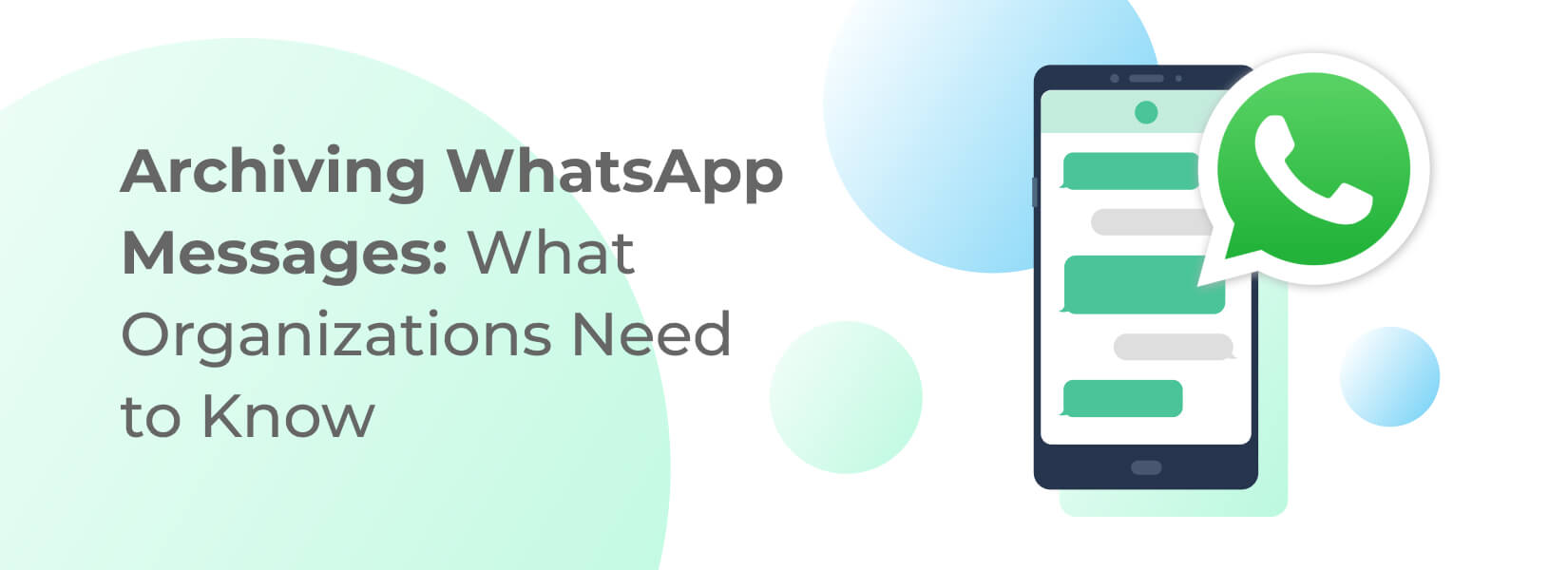Archiving WhatsApp Messages: What Organizations Need to Know

Thanks to its low cost, cross-device support, international coverage and end-to-end encryption, WhatsApp has become the world’s most popular mobile messaging service, with over 2 billion active users. WhatsApp’s popularity extends to the workplace, where it enables companies to connect with their customers and offers teams an easy way to share updates and collaborate.
While WhatsApp can be a boon for customer experience and productivity, its increasing adoption in the workplace also introduces certain risks, especially when it comes to employees sharing potentially sensitive customer or company information. In worst-case scenarios, improper WhatsApp usage can cause organizations to run afoul of laws and regulations.
In this article, we’ll talk about why businesses need to archive WhatsApp messages — both to keep sensitive information safe and to comply with key regulations.
How WhatsApp Became Popular in the Workplace
When Brian Acton and Jan Koum first met in 1997, they probably didn’t anticipate that they would go on to create the world’s most popular messaging app — but that’s exactly what they did in 2009 with the launch of WhatsApp. Originally designed as a simple, secure private messaging service, WhatsApp has since evolved to include audio and video calls and image sharing. There’s even a premium version of the service designed specifically with businesses in mind.
The WhatsApp Business App and WhatsApp Business Platform enable organizations to build business profiles, share product lists and promotions, send order confirmations and shipping updates and deliver real-time support. While WhatsApp’s business offerings are designed with marketing, sales and customer service in mind, the standard version has also become popular for internal communications.
Although WhatsApp uses end-to-end encryption for all messages, it isn’t as secure as other popular business communication platforms, such as Microsoft Teams or Slack. This makes WhatsApp a high-profile target for cybercriminals. In 2019, the app’s developers revealed a vulnerability in their system that enabled hackers to access users’ devices. Three years later, nearly 500 million WhatsApp records were stolen in a massive data leak and posted for sale on the dark web.
But hackers aren’t the only potential threat to businesses that use WhatsApp. Any time an employee sends a WhatsApp message, that message is automatically downloaded to the recipient’s mobile device. There are serious risks to this: Unhappy employees — including those who have been recently terminated — could deliberately expose confidential information to unauthorized parties or tamper with company records. Even employees who are happy in their role risk accidentally sharing classified or deleting business-critical information.
Given these risks, any organization using WhatsApp in the workplace must implement strong security protocols and archive all WhatsApp data.
An Evolving Regulatory Landscape [& Where WhatsApp Compliance Fits In]
As business communications have gone electronic, regulatory authorities have had to adapt existing frameworks, defining new rules and requirements to protect data security and consumer interests. Under many of these regulations, any internal or customer-facing messages sent through WhatsApp are considered business records and are subject to retention and security requirements.
Let’s take a closer look at some industry-specific regulations, and where WhatsApp compliance fits into the bigger picture:
- HIPAA: WhatsApp has become an easy and efficient way for patients to stay in touch with their healthcare providers. Since patients are the ones initiating many of these conversations, they aren’t subject to the Health Information Portability and Accountability Act (HIPAA). However, all other WhatsApp conversations that contain Protected Health Information (PHI) — whether between two covered entities, or between a covered entity and a business associate — absolutely are.
To avoid potential violations, healthcare providers must implement administrative, physical and technical safeguards, such as encryption and access controls, to ensure the confidentiality of PHI. Additionally, healthcare providers must archive all WhatsApp conversations to create a tamper-proof record of professional communications.
- SEC: Under the U.S. Securities and Exchange Commission’s (SEC) Rule 17a-4, investment advisors, broker-dealers and other financial services firms are obligated to capture, retain and supervise all electronic communications in accordance with regulatory requirements.
Failure to preserve WhatsApp and other electronic communications can come with steep financial penalties and, in some cases, legal action, making WhatsApp archiving is absolutely necessary.
- FERPA: While the Family Educational Rights and Privacy Act (FERPA) doesn’t explicitly mention specific communication platforms such as WhatsApp, its principles apply to the handling and disclosure of educational records. As a result, any messages that contain information about student records — such as class schedules, transcripts or attendance records — could be subject to FERPA.
To avoid non-compliance, educational institutions should secure all electronic communications, archive WhatsApp conversations and restrict access to that archive.
- The Equality Act: In the UK, the Equality Act protects individuals from discrimination based on protected characteristics, such as age, gender, race and sexual orientation. Under this Act, any employer, educational institution or business that engages in discriminatory behavior or sends discriminatory messages through apps such as WhatsApp could be subject to legal action.
To avoid this outcome, organizations need to develop clear communication policies, educate employees on the importance of inclusivity and addressing unconscious biases and continuously monitor employee communication, including those on WhatsApp.
- FCA: The Financial Conduct Authority (FCA) in the UK sets regulations and standards for financial services firms to ensure the integrity and transparency of the financial markets. As part of these regulations and standards, the FCA mandates firms to maintain accurate and complete records of their business, including electronic communications. If firms use WhatsApp for business-related communications, these messages may be subject to record-keeping requirements — and, therefore, will need to archive all WhatsApp content.
- MiFID II: Markets in Financial Instruments Directive (MiFID II) imposes regulations on financial services firms in the European Union to enhance transparency, investor protection and market integrity.
When it comes to WhatsApp messages, MiFID II requires firms to record and retain all communications that may result in a transaction, including those conducted on messaging platforms. This means that if firms use WhatsApp for business-related discussions that could lead to a transaction covered by MiFID II, such messages must be recorded and stored according to the directive’s record-keeping requirements.
Additionally, firms are expected to implement measures to ensure the security and integrity of these electronic communications, adhering to MiFID II’s overarching goals of fostering a well-functioning and transparent financial market.
Why Organizations Need to Archive WhatsApp Messages
Regulatory compliance isn’t the only reason organizations need to archive WhatsApp messages. Other benefits include:
- Accurate record-keeping: Archiving WhatsApp communications ensures that organizations have a comprehensive record of all business-related conversations, decisions and agreements. This is essential for internal audits, regulatory compliance, eDiscovery and efficient records management.
- Knowledge management: Archiving messages — from WhatsApp or otherwise — helps organizations create a centralized knowledge base, preserving institutional knowledge even if employees leave the company. This supports business continuity and makes it easier for organizations to train new staff or reference past discussions and decisions.
- Dispute resolution: In businesses both large and small, internal disputes are bound to happen — what matters is how you address them. Archived data, including WhatsApp messages, can provide an accurate timeline of events and communications, clarifying potential misunderstandings and ensuring fair resolutions.
- Policy enforcement: By maintaining a detailed and accurate record of all business communications, including those that take place over WhatsApp, management can monitor adherence to company guidelines and take corrective action if necessary.
- eDiscovery: In the event of pending litigation, archiving all WhatsApp communications ensures the integrity of business records and makes it easier for organizations to respond to eDiscovery requests on time.
- Data privacy and security: Storing WhatsApp messages in a secure archive protects sensitive information from unauthorized access. It also supports data loss prevention by creating a backup of important data, which ensures business continuity.
Why WhatsApp’s Built-in Archive Isn’t Enough
Like most systems of its kind, WhatsApp offers a native archiving function, which can be useful for employees who need to organize their business communications for future reference or who want to silence group chats, but still be able to access those messages. However, this native archiving function does not include internal backup, user permissions, custom data retention policies and other more advanced archiving capabilities necessary for WhatsApp compliance.
To truly cover their bases, organizations need to invest in a dedicated archiving solution that enables them to store not only WhatsApp messages, but other text and SMS messages, social media posts and emails. Such solutions not only make it easy to archive all electronic communications, they also offer advanced features and capabilities that enhance security, prevent data loss, ensure data integrity and make it easy to track down specific information.
What to Look for in a WhatsApp Compliance Archiving Solution
Want to ensure WhatsApp compliance (and prevent data loss)? Then it’s essential that you choose a comprehensive archiving solution for your organization. Here are some key criteria to look for when evaluating potential solutions and vendors:
- Cross-platform archiving including text/SMS messages, email and social media
- Built-in compliance for all major industry regulations and legal statutes
- Automatic data capture for all data types, including text, images, videos and voice calls
- Secure storage through the use of end-to-end encryption and end-user authentication
- Custom role-based permissions to prevent unauthorized access to, or modification of, archival content
- The ability to export content in native and non-native formats, including PDFs, in accordance with various industry regulations, including FINRA and MiFID II
- Message indexing for all WhatsApp conversations to support rapid retrieval of information
- Robust search functionality, including attachment searches, proximity searches, wildcard searches and fuzzy searches
- Legal hold and redaction tools to preserve and prepare documents for legal proceedings
- Tagging functionality to flag important information and add contextual comments
- Custom data retention policies to support WhatsApp compliance with legal statutes and regulations
- Comprehensive customer support, including phone, live chat and 24/7 monitoring
Intradyn’s all-in-one archiving solution delivers all of this and more. Designed to meet the needs of organizations both large and small, our cross-platform solution makes it easy to maintain WhatsApp compliance with all major regulations, respond to eDiscovery requests and safely manage large quantities of company and customer data. See Intradyn in action — watch our free demo today.

